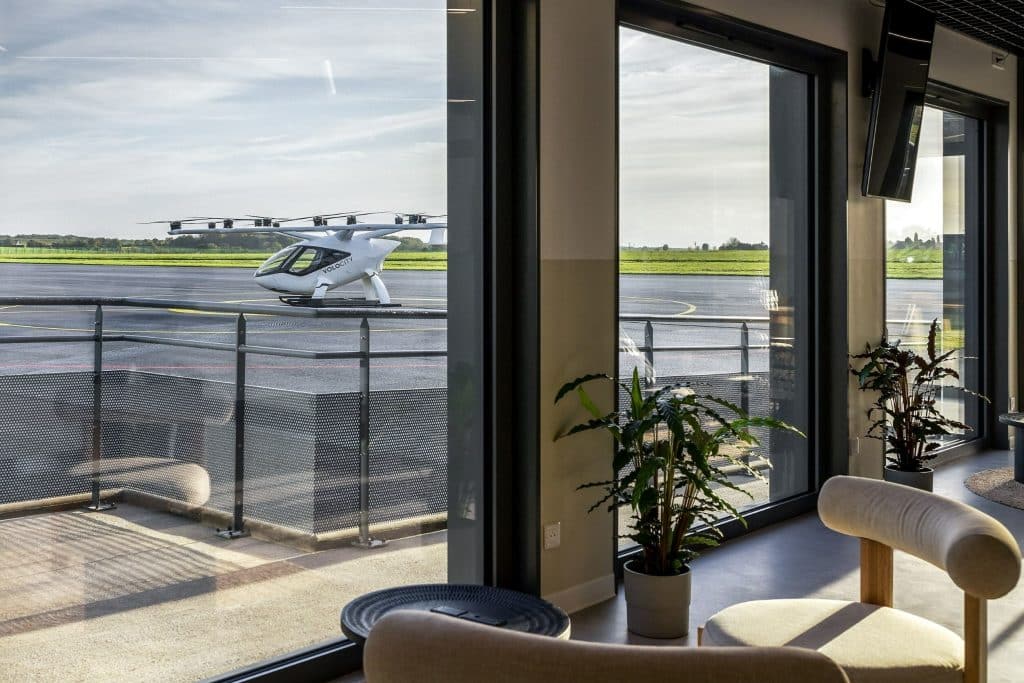SITA partners on ‘vertiport’ digital infrastructure, ponies up to build market
Technology-enabled architecture may transform the airports of tomorrow.
Volocopter, a provider of urban air mobility services, and SITA, an aviation digital identity provider, have agreed to collaborate on building digital infrastructure for vertiports. Meanwhile, the smart airports industry is projected to reach $8.3 billion by 2027, according to a new report from ResearchAndMarkets.com.
The new product offered by Volocopter, the electric air taxi VoloCity, is meant to provide a sustainable form of aviation transportation with multiple mobility options in congested cities. Passengers can call for the aircraft from designated boarding points or “vertiports.”
“Working in concert with our partners, we are setting up for commercial operations,” says Christian Bauer, the chief commercial officer at Volocopter. “This involves establishing the requisite infrastructure, maintenance, flight operations, IT and customer services.”
SITA is leveraging its experience in air transport to develop new standards and a digital-first passenger experience for the emerging urban air mobility (UAM) industry. They offer numerous IT solutions, such as airport management, passenger operations, flight and aircraft operations, baggage processing and border management.
Volocopter has developed the VoloIQ, a digital operating system that enables a holistic UAM ecosystem with end-to-end passenger air transportation experiences. The cloud-based system is in the process of being certified by aviation authorities.
“We will play a key role in delivering this new digital UAM world and defining a seamless, smarter approach to air travel in a city environment,” says Sergio Colella, the SITA president for Europe. “Together, we will turn the theory into practice as early as 2024 when we expect the first commercial eVTOLs to take flight.”
SITA is also investing in this potential new market for its biometrics and digital identity technologies directly, by participating an undisclosed amount to Volocopter’s series E funding round.
Smart airports industry hits $7 billion in 2022
The smart airports industry is expected to grow from 7.0 billion in 2022 to 8.3 billion by 2027, experiencing a CAGR of 3.5 percent over the forecast period from 2022 to 2027, according to the aforementioned ResearchAndMarkets.com report.
The smart airport industry is expected to expand due to the increasing demand for real-time information and self-service technologies, the report continues. Developing existing airports, adopting smart airport solutions at new airports, and green initiatives will drive the market. Airports are implementing biometric passenger identification, self-service kiosks and AI technologies to fuel industry growth further.
The report says that the upgrades and services segment hold the largest market share in 2022 due to airports investing in digital transformation, modern systems and solutions to enhance the passenger experience and the need for improved maintenance services.
Endpoint devices are projected to dominate the system segment of the market during the forecast period due to their ability to speed up airport security screenings, increase security standards and streamline airport procedures, the report says. They are often combined with biometrics, RFID, beacons and other solutions to enhance airport operations and consumer satisfaction further.
The smart airports market is expected to be mainly driven by the airport 3.0 segment during the forecast period due to increasing air traffic passengers and airport modernization plans.
The non-aeronautical segment is estimated to have been the most significant contributor to the smart airports market in 2022.
The report says that increased air passenger travel and related services such as intelligent transportation, inventory management and digital advertising will drive this growth.
According to the report, North America is projected to witness the highest CAGR during the forecast period.







